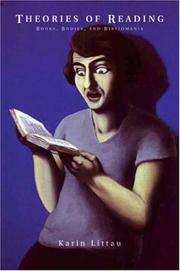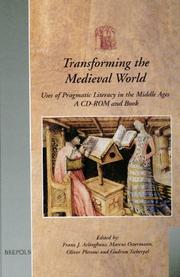| Listing 1 - 2 of 2 |
Sort by
|

ISBN: 9780745616582 9780745616599 0745616593 0745616585 Year: 2006 Publisher: Cambridge Polity press
Abstract | Keywords | Export | Availability | Bookmark
 Loading...
Loading...Choose an application
- Reference Manager
- EndNote
- RefWorks (Direct export to RefWorks)
"Why do literary theorists see reading as an act of dispassionate textual analysis and meaning production, when historical evidence shows that readers have often read excessively, obsessively, and for sensory stimulation? Posing these and other questions, this is the first major work to bring insights from book history to bear on literary history and theory. In so doing, the book charts a compelling and innovative history of theories of reading. While literary theorists have greatly contributed to our understanding of the text-reader relation, they have rarely taken into account that the relation between a book and a reader is also a relation between two bodies: one made of paper and ink, the other flesh and blood. This is why, Karin Littau argues, we need to look beyond the words on the page, and pay attention to the technical innovations in the physical format of the book. Only then is it possible to understand more fully how media technology has changed our experience of reading, and why media history presents a challenge to our conceptions of what reading is. -- Book cover.
Cognitive psychology --- Literature --- Reading interests. --- Lecture, Goût de la --- Lecture, Goût de la --- 028 --- 82.085.43 --- 316.773.3:02 --- 82.085.43 Literaire receptie --- Literaire receptie --- 028 Lezen. Lectuur --- Lezen. Lectuur --- 316.773.3:02 Boek: communicatieinhoud--(communicatiesociologie) --- Boek: communicatieinhoud--(communicatiesociologie) --- Books and reading. --- Livres et lecture. --- Lecture, Goût de la. --- Buch. --- Bibliophilie. --- Lesen. --- Leser. --- Böcker och läsning. --- Läsning. --- Läsvanor. --- Litteraturreception. --- Läslust i litteraturen. --- Books and reading --- Reading interests --- Interests, Reading --- Reader interest --- Reading, Choice of --- Reading habits --- Appraisal of books --- Books --- Choice of books --- Evaluation of literature --- Reading and books --- Reading public --- Reading --- Reading promotion --- Appraisal --- Evaluation --- Livres et lecture --- Documentaire informatie --- Boekgeschiedenis --- Cognitieve psychologie --- Book history

ISBN: 9782503511665 250351166X 9782503539393 Year: 2006 Volume: 6 Publisher: Turnhout Brepols
Abstract | Keywords | Export | Availability | Bookmark
 Loading...
Loading...Choose an application
- Reference Manager
- EndNote
- RefWorks (Direct export to RefWorks)
When viewed retrospectively, the period between the eleventh and the fifteenth centuries was a phase of European history that was characterized by a radical and fundamental media transformation. Before this time, the vast majority of the population had never encountered the written word in their day-to-day activities. From the beginning of the second millennium, however, texts began to appear in, and influence, almost every sphere of human life. Medieval written texts were subject to revision, copying, embellishments, and deletions; they were read silently and aloud, and they were recited in a variety of contexts.
Mass communications --- anno 1100-1199 --- anno 1200-1499 --- anno 1000-1099 --- Europe --- Written communication --- Literacy --- Communication écrite --- Alphabétisation --- History --- Histoire --- Writing --- Civilization, Medieval --- Communication --- --Écriture --- --Littérature --- --Moyen âge, --- 091 --- 316.773.3:02 --- 930.85.42 --- Handschriftenkunde. Handschriftencatalogi --- Boek: communicatieinhoud--(communicatiesociologie) --- Cultuurgeschiedenis: Middeleeuwen --- Languages & Literatures --- Philology & Linguistics --- Civilization, Medieval. --- 930.85.42 Cultuurgeschiedenis: Middeleeuwen --- 316.773.3:02 Boek: communicatieinhoud--(communicatiesociologie) --- 091 Handschriftenkunde. Handschriftencatalogi --- Communication écrite --- Alphabétisation --- Written discourse --- Written language --- Discourse analysis --- Language and languages --- Visual communication --- Chirography --- Handwriting --- Ciphers --- Penmanship --- Illiteracy --- Education --- General education --- Medieval civilization --- Middle Ages --- Civilization --- Chivalry --- Renaissance --- 028 --- 028 Lezen. Lectuur --- Lezen. Lectuur --- To 1500 --- Written communication - Europe - History - To 1500. --- Writing - Europe - History - To 1500 --- Literacy - History - To 1500 - Europe --- Écriture --- Littérature --- Moyen âge, 476-1492 --- Acqui 2006
| Listing 1 - 2 of 2 |
Sort by
|

 Search
Search Feedback
Feedback About
About Help
Help News
News